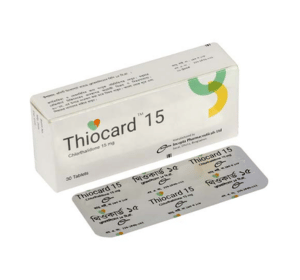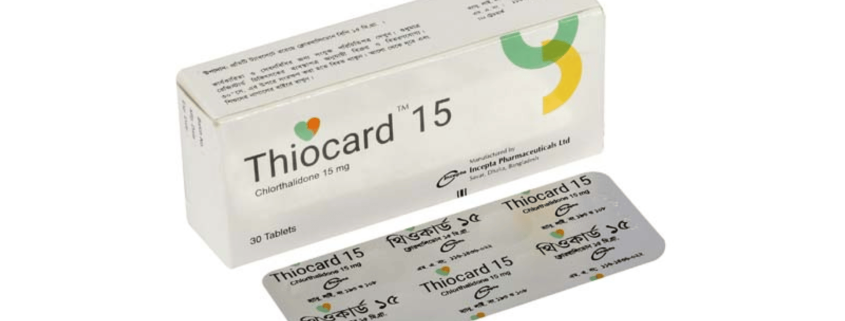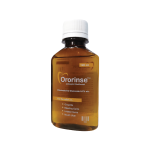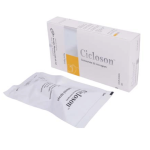Thiocard(Chlorthalidone)

Therapeutic Group: Combined Antihypertensive preparation
Presentation
Thiocard 15: Each tablet contains Chlorthalidone BP 15 mg.
Thiocard 25: Each tablet contains Chlorthalidone BP 25 mg.
Description
Chlorthalidone is a long-acting oral diuretic with antihypertensive activity. Its diuretic action starts a mean of 2.6 hours after dosing and continues for up to 72 hours. The site of the action of Chlorthalidone is distal convoluted tubule of the nephron. It produces diuresis with increased excretion of sodium and chloride. The diuretic effects of chlorthalidone lead to decreased extracellular fluid volume, plasma volume, cardiac output, glomerular filtration rate, and renal plasma flow in patients with hypertension and edema.
Indications
• Management of hypertension either alone or in combination with other antihypertensive drugs
• Adjunctive therapy in edema associated with congestive heart failure, hepatic cirrhosis, and corticosteroid and estrogen therapy
• Edema due to various forms of renal dysfunction such as nephrotic syndrome, acute glomerulonephritis, and chronic renal failure.
Dosage & Administration
Therapy should be initiated with the lowest possible dose, then titrated according to individual patient response. A single dose given in the morning with food is recommended; divided doses are unnecessary.
Side Effects
Anorexia, gastric irritation, nausea, vomiting, cramping, diarrhea, constipation, dizziness, vertigo, headache, purpura, photosensitivity, rash, urticaria, Orthostatic hypotension aggravated by alcohol, barbiturates or narcotics, hyperglycemia, muscle spasm, weakness, restlessness.
Precautions
Hypokalemia and other electrolyte abnormalities, including hyponatremia and hypochloremic alkalosis are common in patients receiving chlorthalidone. Serum electrolytes should be determined before initiating therapy and at periodic intervals during therapy. All patients taking chlorthalidone should be observed for clinical signs of electrolyte imbalance, including dryness of mouth, thirst, weakness, lethargy, drowsiness, restlessness, muscle pains or cramps, muscular fatigue, hypotension, oliguria, tachycardia, palpitations and gastrointestinal disturbances, such as nausea and vomiting.
Use in Pregnancy & Lactation
Pregnancy:
Thiazides cross the placental barrier and appear in cord blood. There are no adequate and well-controlled studies of Chlorthadine in pregnant women so this drug should be used during pregnancy only if clearly needed.
Lactation:
Thiazides are excreted in human milk. Because of the potential for serious adverse reactions in nursing infants from chlorthalidone, a decision should be made whether to discontinue nursing or to discontinue the drug, taking into account the importance of the drug to the mother.
Drug Interaction
• Chlorthalidone may add to or potentiate the action of other antihypertensive drugs.
• Insulin requirements in diabetic patients may be increased, decreased or unchanged. Higher dosage of oral hypoglycemic agents may be required.
• Chlorthalidone and related drugs may increase the responsiveness to tubocurarine and may decrease arterial responsiveness to norepinephrine.
• Lithium renal clearance is reduced by chlorthalidone, increasing the risk of lithium toxicity
Over Dose
Symptoms of acute overdose include nausea, weakness, dizziness and disturbances of electrolyte balance. There is no specific antidote but gastric lavage is recommended, followed by supportive treatment.
Storage
Do not store above 30 C. Keep away from light and out of the reach of children.
Commercial Pack
Thiocard 15: Each box contains 3 Alu-Alu blister strips of 10 tablets
Thiocard 25: Each box contains 3 Alu-Alu blister strips of 10 tablets



